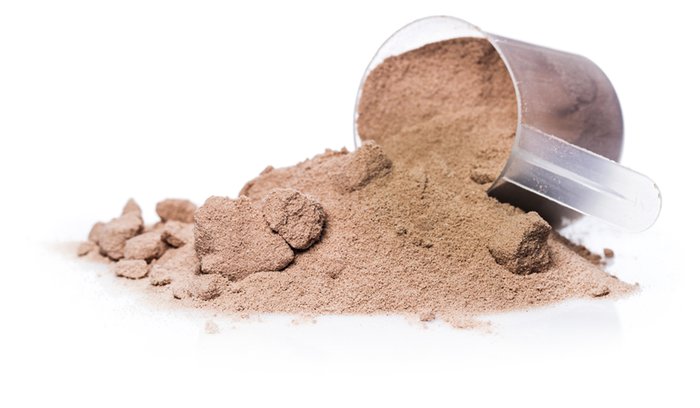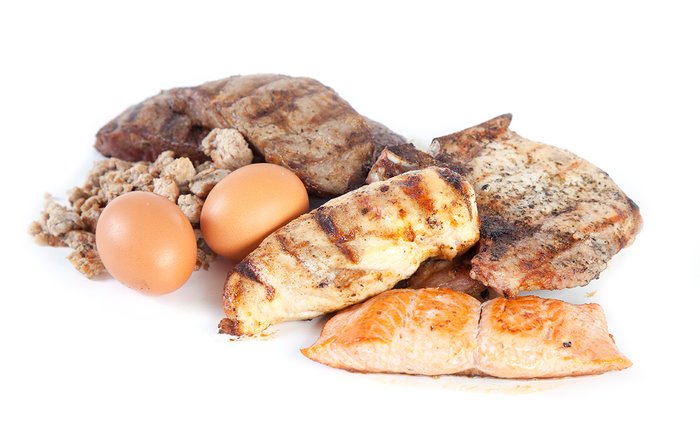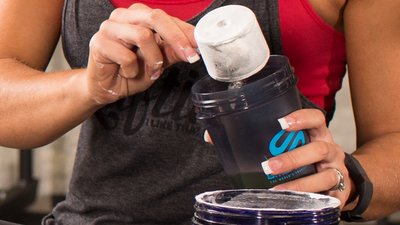"Female Bodybuilder Dies From Eating Too Much Protein," the headline from The Independent read. "Mom's Death Blamed On Bodybuilding Supplements Ahead of Competition," said USA today. And the Drudge Report ran with the simple, "Bodybuilder Dead From Too Much Protein."
Typically, sensationalistic journalism circles the drain of history with little more than a sigh. This story, however, grew with time and, as recent as August 15, was covered by CNN. Maybe a friend or family sent it to you out of concern.
But CNN's headline did get at least one thing right that nearly no other news outlet did: The woman who tragically died, 25-year-old Meegan Hefford, had a rare genetic disorder. That's the actual story.
Here's what you need to know and what the existing science actually says about high-protein diets.
UCD: The Disorder That Took a Lifter's Life
Meegan Hefford suffered from a condition known as "urea cycle disorder," or UCD. It's quite rare that anyone who has this disorder knows they do, and in her case, it seems clear that she did not.
Put as simply I can, UCD is a genetic disorder that involves a dysfunction of certain enzymes involved in detoxifying nitrogen—the backbone of protein—and using the ammonia to eventually create the amino acid arginine. This results in a build-up of ammonia in the body, and a failure to produce arginine.
In minor cases, a person can go much of their lifetime never knowing they possess the genetic defect. They may experience symptoms such as general malaise, nausea, or mental fogginess, but attribute them to something else.

Current estimates suggest that 1 in 8,000-44,000 people are born each year with UCD, but many researchers think the prevalence of UCD may be even greater.[1] Approximately 50 percent of people with UCD are identified early in life and can be treated with a combination of a low-protein diet and the use of a new drug that helps detoxify the ammonia that could otherwise lead to seizures, permanent neurological damage, or death.
The most common triggers that result in a UCD-induced emergency include infections and major catabolic events such as an infection or illness, the use of high-dose corticosteroids, extreme dieting, surgery, or extreme physical activity. Protein intake that increases blood ammonia concentrations by greater than 25 umol/L, or results in sustained blood ammonia concentrations in excess of 100 umol/L, is another common trigger.[2]
There are many other symptoms of extreme UCD, most of them neurological, and all of them unpleasant. Suffice it to say, genetic tests or other tests performed by a doctor are the best ways to determine if you have the condition—and if you do, then working with a doctor to combat it is a no-brainer.
So Is High-Protein Nutrition Safe?
Unless you have a very specific medical reason why not, yes, it is safe. All published evidence strongly suggests that protein and high-protein diets are incredibly safe when consumed by healthy individuals with no known illness or disorder that would make consuming such products or diets risky.[3]
A recent review, for example, reported that "there is little evidence that a high protein intake is dangerous to healthy individuals." In response to the well-traveled idea that high protein diets can cause weak bones, the authors concluded that, "Despite the controversy surrounding a high-protein diet and bone health, higher protein intake seems to be beneficial for bone mineralization and maintenance in a healthy population."[4]

A colleague and friend of mine, Dr. Jose Antonio, at Nova Southeastern University, recently provided some of the most convincing, long-term evidence to date. Dr. Antonio and his team reported no adverse effects on blood, liver, or kidney measures of safety in resistance-trained individuals that consumed between 3-4.2 times the recommended daily intake of protein for one year. That's about 1.14-1.51 grams of protein per pound of body weight, per day, versus the RDA of 0.36 g/lb/d).[5]
Despite such consistent evidence in support of high-protein nutrition in otherwise healthy individuals, why then does the false narrative of "too much protein" continue to be so pervasive? Why would a respected news source such as CNN waste time reporting that the deceased's mother "discovered containers of protein supplements in her daughter's kitchen, along with a strict [high-protein] food plan," when all evidence supports that it was an undiagnosed genetic disorder that was to blame?
The reason is simple: There's a bogus narrative perpetuated by dieticians and family practitioners rich in public respect, but poor in topical knowledge. Disciplined, driven bodybuilders and the shakes they drink simply make for an easy bogeyman.
Take it from me: Don't fear protein. Don't fear fitness. Know your body, work with your doctor to combat what ails it, and chase your goals relentlessly.
References
Nettesheim, S., Kölker, S., Karall, D., Häberle, J., Posset, R., Hoffmann, G. F., ... & Garbade, S. F. (2017). Incidence, disease onset and short-term outcome in urea cycle disorders–cross-border surveillance in Germany, Austria and Switzerland. Orphanet Journal of Rare Diseases, 12(1), 111.
Lee, B., Diaz, G. A., Rhead, W., Lichter-Konecki, U., Feigenbaum, A., Berry, S. A., … Scharschmidt, B. F. (2015). Blood ammonia and glutamine as predictors of hyperammonemic crises in urea cycle disorder patients. Genetics in Medicine : Official Journal of the American College of Medical Genetics, 17(7), 561–568.
Westerterp-Plantenga, M., Lemmens, S., & Westerterp, K. (2012). Dietary protein–its role in satiety, energetics, weight loss and health. British Journal of Nutrition, 108(S2), S105-S112.
Cuenca-Sánchez, M., Navas-Carrillo, D., & Orenes-Piñero, E. (2015). Controversies surrounding high-protein diet intake: satiating effect and kidney and bone health. Advances in Nutrition: An International Review Journal, 6(3), 260-266.
Antonio, J., Ellerbroek, A., Silver, T., Vargas, L., & Peacock, C. (2016). The effects of a high protein diet on indices of health and body composition–a crossover trial in resistance-trained men. Journal of the International Society of Sports Nutrition, 13(1), 3.

